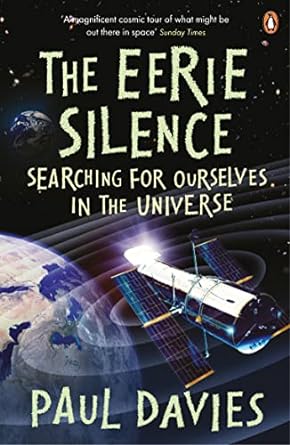The Eerie Silence
Searching for Ourselves in the Universe, By Paul Davies
Summary

| Content | 7/10 |
| Readability | 8/10 |
| Presentation | 8/10 |
| Ideas | 7/10 |
| Value for money | 8/10 |
| Did it do what it said on the box? | 7/10 |
How do the rankings work?
The Review
Enjoyable and intriguing review of the state of SETI
This book is a review, at the 50 year point, of the Search for Extra-Terrestrial Intelligence (SETI), and a consideration of how it may evolve in the future, by the scientist who heads several of its key committees. It’s a wide-ranging discussion which provides some answers for Enrico Fermi’s great challenge (“Where is everybody?”), and prompts the reader to consider how much we really know given how much our knowledge has advanced and changed since SETI was established in the early 1960s.
The early part of the book is focused on the current evidence for other forms of intelligent life, considering what we know of its genesis, the evidence (or rather profound lack thereof) for any second start either on earth or in the solar system, and whether evolution will naturally or regularly produce intelligent, scientific and technical species. Here Davies takes a fairly negative view, although he acknowledges that we have simply failed to uncover evidence from our earth-based viewpoint, and that “absence of evidence is not evidence of absence”.
The latter part looks at the potential forms of a “galactic diaspora”, accounting for our vastly increased knowledge of alternative information carriers, information systems, machines and engineered probes including the conventional, the biological and those based on nano-technology. Again there’s no evidence yet, but this section explains that alien signals or probes might just be too different, or too small, for us to detect. The conclusion is that we need SETI to avoid being athropocentric, and especially not “1960s radio astronomer centric”.
The final chapters explain the current state of preparation for First Contact (which seems to consist mainly of international committees sending telegrams to each other, and may not be up to the arrival of city-sized spaceships over the capital cities of the UN Security Council :)). The author also discusses what form of messages we should choose if and when we do send any ourselves. The assertion that only key mathematical and physical theorems are guaranteed to bridge all scientific species is a sound one, but maybe misses the point that the Pioneer plaques and similar are just as much an expression of our humanity to ourselves as a serious attempt to communicate with minimum ambiguity.
While the book is inspiring and thought-provoking, it’s also a bit frustrating in places. Davies asserts correctly that the Earth is progressively becoming “radio silent” to long-distance observers, but blames this entirely on the move to put major long distance communication channels into cables. A more complete explanation is that our world is full of vastly more wireless communication that 50 years ago, but as we adopt spread-spectrum and encryption technologies and get better at using low power and highly directed signals the “overspill” into space is much more difficult to detect. Similarly he presents an explanation of Galactic Inflation I haven’t read before (the absence of magnetic monopoles), but fails to present the more common justifications.
In considering alterative technologies Davies binds himself with our current science, despite the fact that there is significant evidence (the failure to unify General Relativity and Quantum Physics, the lack of any real explanation for Dark Matter and Dark Energy) that there are things about the Cosmos we just don’t understand, and which an alien civilisation (or a future humanity) may exploit. While Davies correctly advises against wishful thinking, it would be prudent to accept that just as our own understanding has changed vastly in the last 100 years, it will likely change again in the future, perhaps opening up valid options for, for example, super-light speeds.
However, those criticisms aside, this is an enjoyable, intriguing and well worth-while book. In the final few pages Davies himself observes that there is a contention between the official views of Davies the relatively cautious scientist and Davies the philosopher, human being and SETI enthusiast, and some of the challenges come from presenting and navigating those different viewpoints, which overall is done very well. I thoroughly enjoyed this book, and recommend it.
Buy It From Amazon
Amazon.co.uk  |  | Amazon.com
|

 Thoughts on the World (Main Feed)
Thoughts on the World (Main Feed) Main feed (direct XML)
Main feed (direct XML)